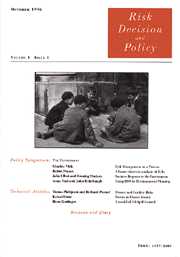Article contents
Satisficing and fairness in ultimatum bargaining game experiments
Published online by Cambridge University Press: 21 November 2002
Abstract
We re-examine the subjects’ behavior in the ultimatum bargaining experiments studied by Roth et al. (1991, American Economic Review). In our model, un-modeled factors including rationality determine players’ initial aspirations, and a modified version of the case-based learning process governs subsequent adaptations. The calibration results of this paper show that ‘satisficing’ can explain the actual subjects’ behavior surprisingly well. More precisely, it is shown that 77.7% to 96.7% of the observed behavior is consistent with our model prediction. We also argue that the closer the initial aspiration levels are to the perfect equilibrium payoff, the lower the mean or modal offer tends to be in the actual experiments.
Information
- Type
- Research Article
- Information
- Copyright
- Copyright © Risk Decision and Policy 2002
- 1
- Cited by

